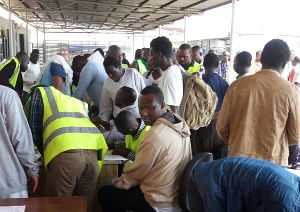The government of Ghana did not take seriously the reviewed immigration policies by the Donald Trump-led US government, Dr Amanda Coffie, a lecturer at the Legon Centre for International Affairs and Diplomacy, has said.
Almost 80 Ghanaian illegal immigrants in the United States of America have been deported. They arrived at the Kotoka International Airport (KIA) in Accra on Wednesday 14 June in handcuffs.
The deportees, most of whom had no records on them, are the second batch of immigrants to be brought back since Donald Trump became President of the US.
In April this year, the US Ambassador to Ghana, Robert P Jackson, said about 7,000 Ghanaians living illegally in the US were being processed for deportation.
Asked by Valentina Ofori-Afriyie whether the Ghanaian government was guilty of not taking the earlier information seriously, Dr Coffie answered: “I’m sorry to say yes.”
The Government has said that the National Disaster Management Organisation (NADMO), the Ghana Immigration Service (GIS), and the Ghana Police Service will screen the deportees upon arrival.
But Dr Coffie is of the view that “we have to move beyond validation” and institute measures to receive them in a better way.
For her, if government had initiated processes as soon as it received news from the US Embassy about its plans of deportation, officials at the Ghanaian Embassy in US could have moved to “put a more human face to these deportations and also have a more positive outcome than what we are seeing now”.
“It is not a very good image to see your citizens in shackles. There are a number of consulates there who can reach out to those willing to come to prevent being put in shackles and all that,” she added.
She indicated that by constituting proper measures, government can get data from the deportees and find out those with certain skills and resources that they could bring, and “harness it towards Ghana’s development as well as to help the individuals because these processes are traumatic and you can ease that by implementing certain returnee policies”.
General News of Wednesday, 14 June 2017
Source: classfmonline.com













